State Sen. Annette Cleveland and Reps. Sharon Wylie and Monica Stonier answer submitted questions at Vancouver gathering
VANCOUVER — Today, state lawmakers head back to Olympia to begin the 2020 session, and over the weekend Sen. Annette Cleveland (D-Vancouver), Rep. Sharon Wylie (D-Vancouver) and Rep. Monica Stonier (D-Vancouver) of the 49th Legislative District answered community submitted questions at a town hall in Vancouver.
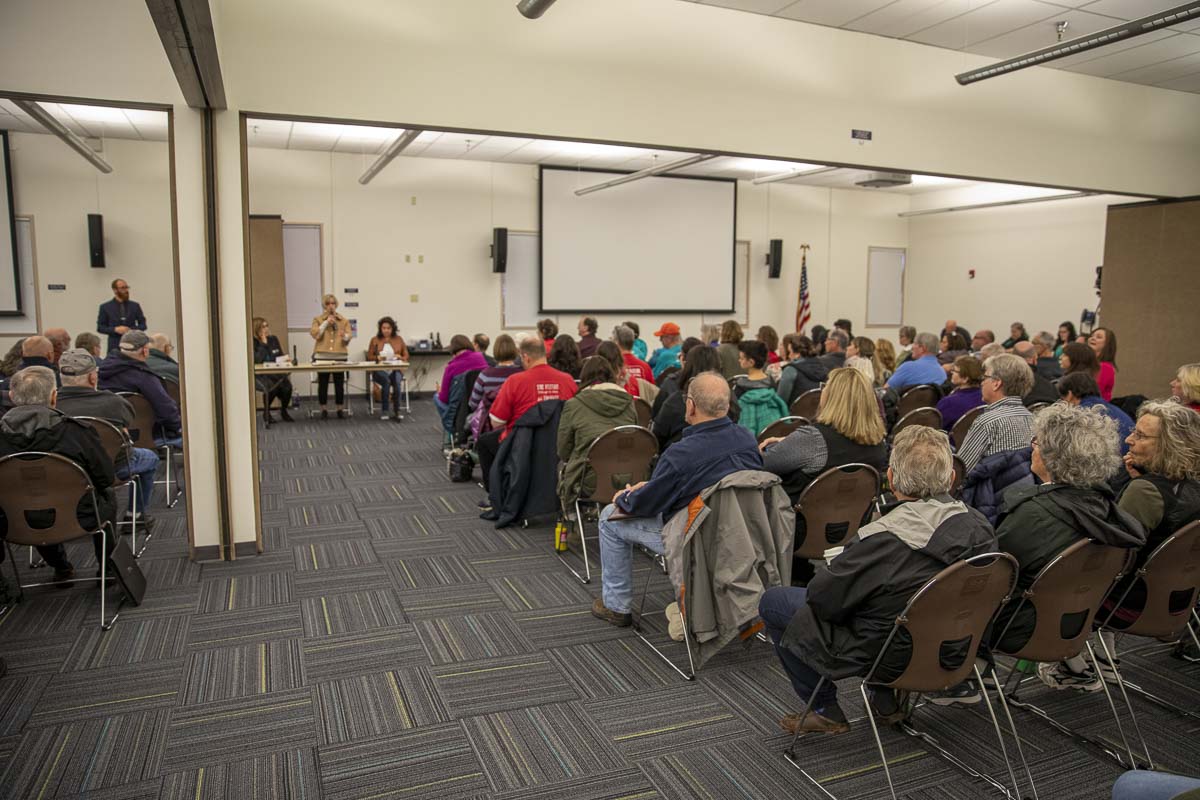
A full house packed the main conference room of the ESD 112 building Saturday morning, as Stonier opened the gathering. Each lawmaker opened with their current committee assignments and some main goals for 2020.
Wylie began with the first questions, briefly addressing new voting legislation as it pertains to ranked choice voting. She explained her past support for similar legislation, and said she thinks the ranked choice system would have to show its value at the local level.
Wylie also spoke to a question regarding partisan disagreement, and how would lawmakers work together in 2020. Wylie responded saying, “One of the things that I do when I have many long discussions with somebody who disagrees with me on energy or guns or anything else, I just invite them for coffee. And we talk a little bit deeper and look for some common ground and hopefully agree to disagree.”
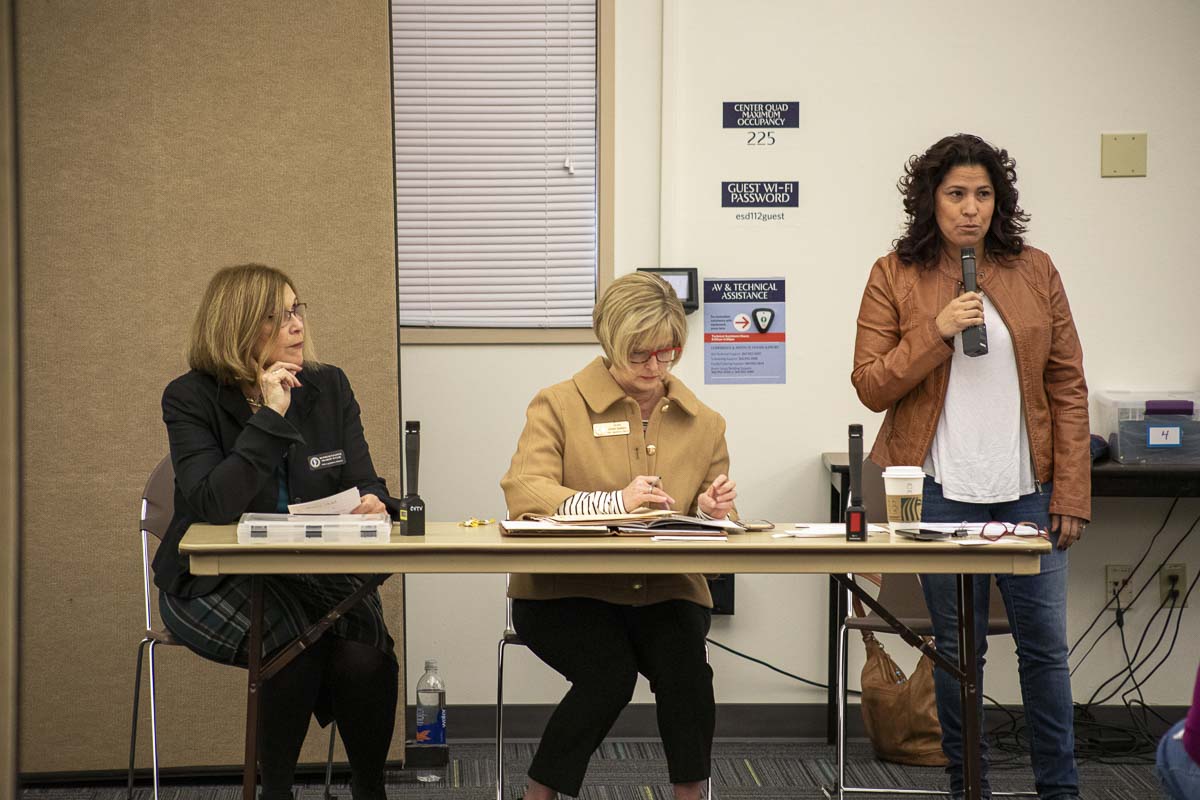
Following Wylie, Cleveland began a conversation on Clean Fuels for Washington. Cleveland currently sits on the Senate Transportation Committee, and was questioned about bringing such legislation to vote this year.
“Oregon has already passed the Clean Fuels program as well as California, British Columbia,” Cleveland said. “That program in Oregon is off to a great start and with our state, not having moved from forward yet, I think that it’s more impetus than ever for us to ensure that we’re doing all that we can to reduce carbon pollution.”
Some 10 question cards asked similarly themed questions, and prompted Stonier and Wylie to add their thoughts.
“That bill is a priority for the House and we are preparing to bring that up again on the floor,” Stonier said. “I voted in support of it and will continue to support that effort. There is some work continuing on that bill to just make sure that we, as we move towards energy efficiency, we are doing so in a way that is mindful of all of the other efforts that might be happening around the state.”
“I supported it, I continue to support it,” Wylie said. “And I’m very determined that we get some improvements before we leave.”
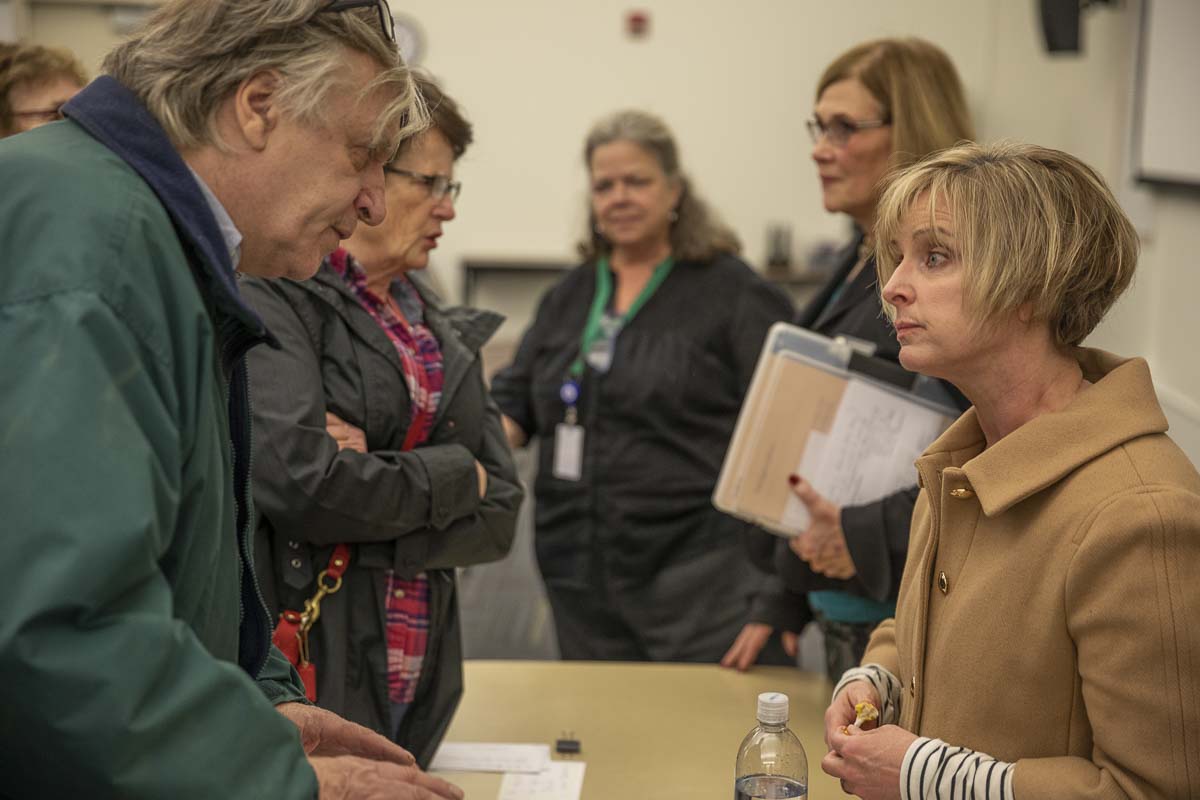
Perhaps the most widely addressed topic of the day was Comprehensive Sexual Education for public school students. Stonier responded first and at greater length, than her colleagues. The first question asked why would lawmakers sponsor House Bill 2184, that would “take away a community’s ability to make decisions about comprehensive sex ed?”
“We have children, teenagers, young adults, who are unaware of the risks that they’re putting themselves in,” Stonier said, in support of HB 2184. “And the more information they have, the safer they will be in their adult lives, the safer they will be in their teen lives, and the safer they will be in their neighborhoods.”
Stonier then spoke to the part of the questions alleging she did not support opt-out policies with sex ed in public schools.
“That is misinformation, I absolutely do not support that. I would not support a version of this bill that does not allow parents to opt their children out,” she said. “I prefer to be the first teacher in my child’s life on issues such as this and many other things. And I think every parent has a right to do that.”
Stonier went on to say that she sees potential with her Republican colleagues for a bipartisan vote on comprehensive sex ed. The representative described what she sees as a cultural shift from misinformation to accurate instruction, while still allowing parents the choice of opt-out.
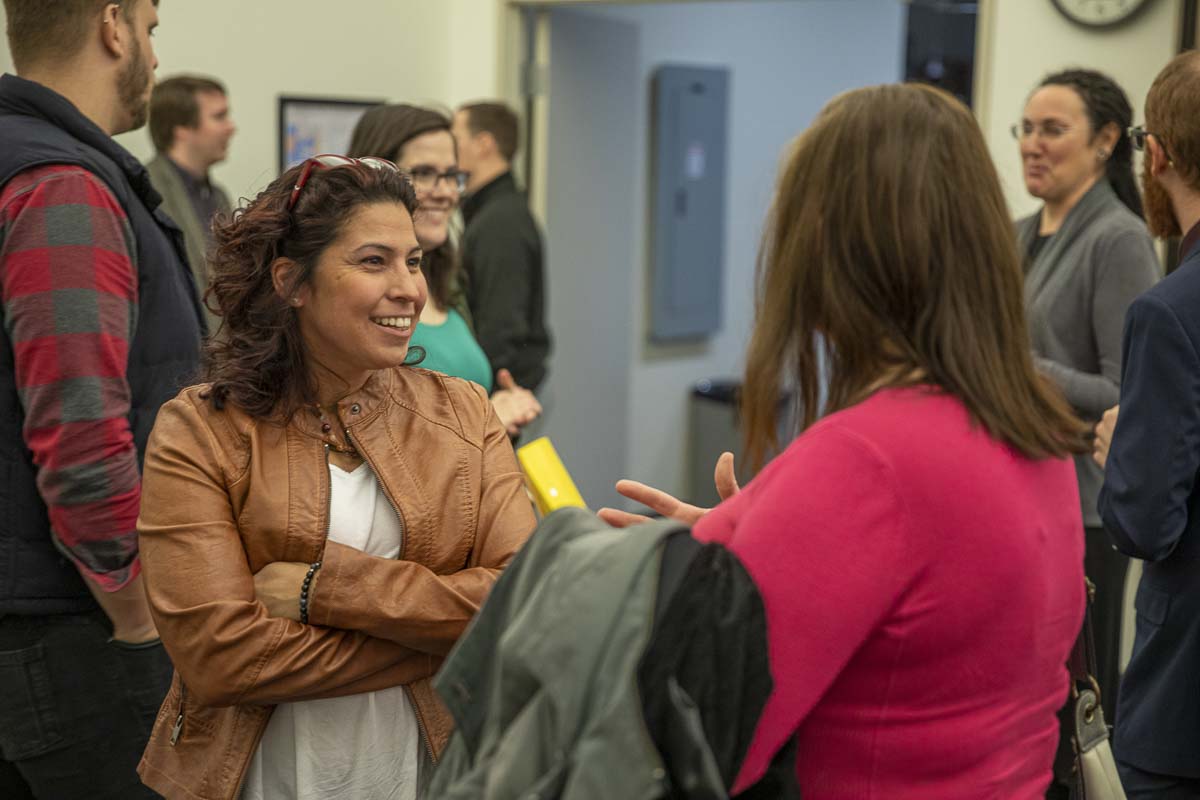
Cleveland was next to comment and expressed many of the same viewpoints, as well as commenting on discussions her and her colleagues had on the Senate’s Health Care Committee.
“We often talk in committee about issues that are uncomfortable or difficult, emotional,” Cleveland said. “I will say that our focus, whenever we’re discussing any health related issues, always first and foremost on better education, better awareness in order to prevent diseases and conditions in the first place.”
Wylie then responded, sharing an anecdotal instance from the past when she worked with young people and their families, who were victums of sexual assault.
“I think that it’s really important that we all have our eyes wide open and that we teach our children all of the information they need to feel safe,” she said. “I agree with Monica, that we need to try our very best to respect the different opinions about that, but one of the things that’s true is that we try to protect everybody and sometimes we don’t succeed, but this is an area where I’m really committed to move forward.”
To finish the group’s responses to the topic, Stonier commented on a question suggesting a rise in certain STDs and asking what lawmakers can do to stop the rise.
“The research shows that the more information and the more education kids have about, again, risky behaviors, disease prevention, the better,” Stonier said. “Those things are prevented, and so I think this is a lack of education, if there is truly a spike that dramatic.”
Moving along to the second largest topic of the meeting, the I-5 Bridge, Cleveland took the lead on answering several similar questions, as she sits on the Senate Transportation Committee.
“We have now sat down, the two states, together four different times. We’re continuing to work together to determine how it is that we’re going to replace that bridge,” Cleveland said. “One span opened Feb. 14 of 1917, has served us well for over 100 years, but it’s time that we replace that bridge. This is a preservation and maintenance project. This is not a project aimed at increasing capacity or you know, adding more lanes. And when I say ‘we’ I don’t necessarily mean me, or those of us here today, I mean our children.”
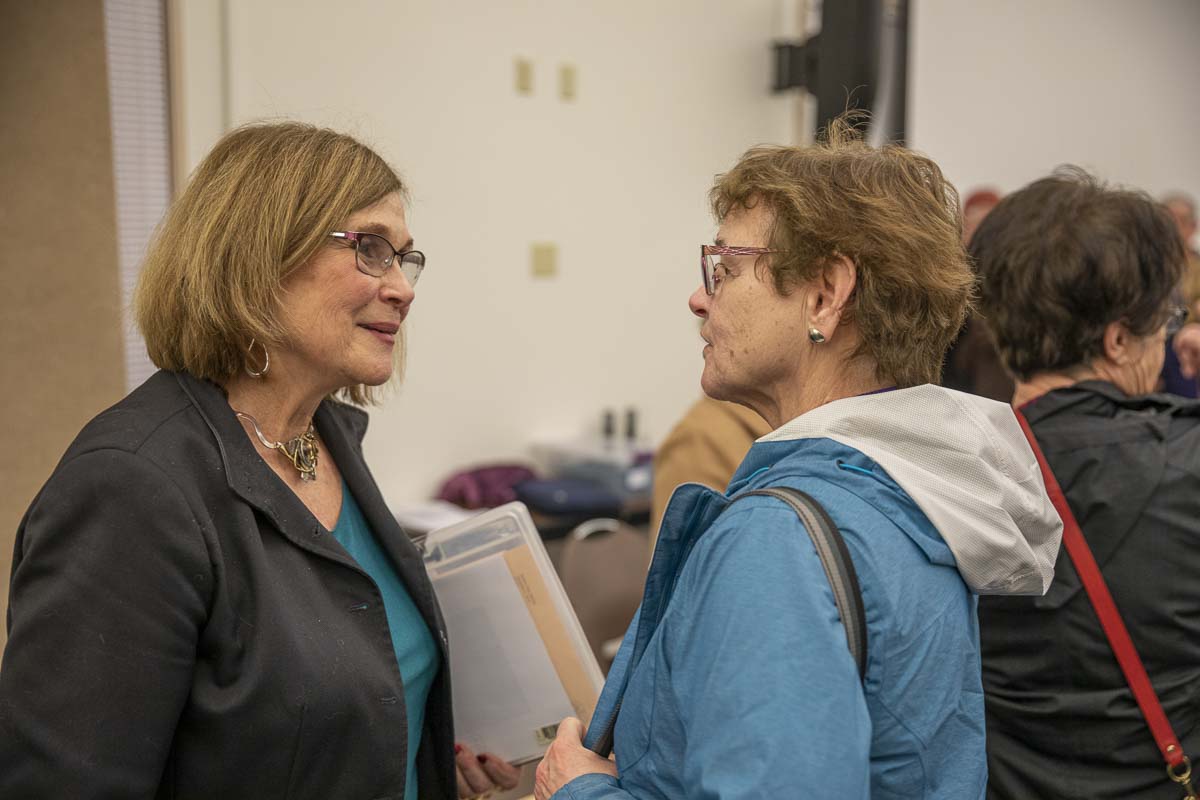
A brief portion of the meeting was devoted to the lawmakers’ opinions on Rep. Matt Shea of the 4th Legislative District near Spokane, who had a state-initiated investigation about him released last month. In it is a detailed assessment of past actions by Shea to take part in domestic terrorism and inciting violence against his politcal opponents.
The report has prompted the Republican caucus to remove Shea from their midst, and for others to call for his resignation.
“I want to be very clear about a couple of things here, first of all, because he may hold some positions and may have very openly participated in things that I may personally not agree with, he still has a right to do those things as long as they are in accordance with the law,” Stonier said. “But I but I do feel that when we see evidence that those are imposing on the rights of others to live safe and healthy lives, that that’s a problem.”
Following comments on Rep. Shea, Wiley moved into answering questions related to the murder of Tiffany Hill in Vancouver last year, as well as laws on bail.
“This issue has been really traumatic for our community,” Wiley said. “The judge in question is one of the good guys in general. And what I also found out was that our unique state constitution has an absolute right to bail unless you’re in for a capital crime. So I’ve got a bill that will go as far as we can. I also have a referral for a constitutional amendment that will be clearer about keeping people safe when they go out on bail.”
The lawmakers from the 49th District went on to discuss Healthcare for All in Washington, legislation allowing for refunds with donations to nonprofits found to be corrupt, B&O Taxes for the self-employed, voter turnout, and the census.
Later, the group came to a brief discussion of the McCleary Decision and public school and college teacher strikes that have occurred and are still occurring. Stonier spoke to the issues surrounding pay-out of the McCleary money.
“The allocation model, known as regionalization, has a mile radius circle that takes into account the economic metrics for that radius, and that determines how money gets driven out to the districts in Southwest Washington,” Stonier said. “Guess what happens at the river, that radius that comes to a full stop. So our districts were not inconsistent with the truth when they were saying the funding is not necessarily what is perceived to be truly there. Our region has a problem in the funding model.”
In the final 15 minutes or so, the group briefly answered a varied selection of questions. First, they addressed I-976 and its passage in 2019. The initiative made all car tabs a flat rate of $30 and is being considered by some unconstitutional, but must be determined by the Washington Supreme Court in 2020. Until then, it remains on the books as law.
“We’re actually not disregarding the initiative. The initiative passed until it’s decided by the courts. It is the law of the land,” Wylie said. “So everything we do has consequences. People think their vote doesn’t matter. Hell yes, it matters. It has real consequences, and we’re going to have to figure out how to deal with those consequences.”
Stonier then touched on the mental health of public school students and employees.
“We have a bill moving through the legislature right now … which acknowledges the secondary trauma that teachers and school first responders, the front desk administrators experience when working with the trauma that kids experience,” Stonier said. “While the student experience increases, we know that the impact on our staff increases. We really have to make sure that we have healthy and prepared adults responding to students.”
Finally the group acknowledged a question regarding the format of their town hall. The question compared the 49th Legislative District town hall to the 18th’s, which included open questions and dialogue. Stonier and the group responded to submitted questions and did not take questions during the meeting, but rather one-on-one afterwards.
Stonier explained that they chose the format in lieu of better time management, but were still open to the format of a dialogue. She mentioned a desire to have an interactive screen at their next gathering, projecting questions in real time.




